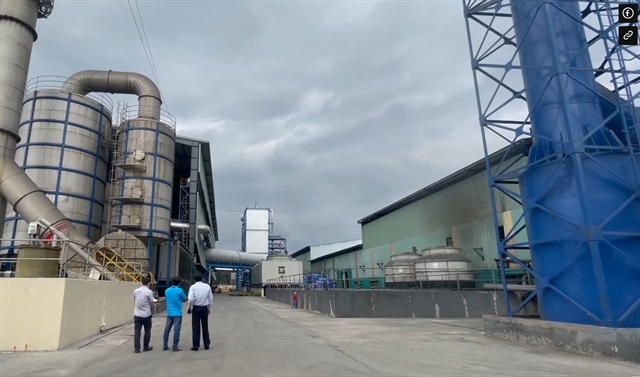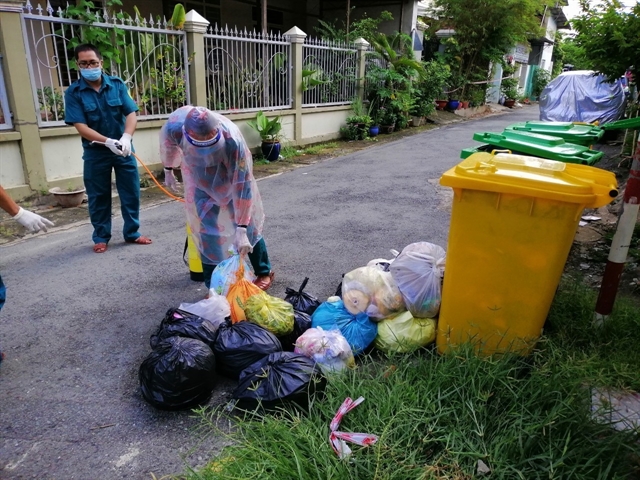 Environment
Environment

As the healthcare professionals are racing to save lives in Bình Dương, environmental workers are also on the front line to make sure COVID-19 related waste from hospitals, quarantine facilities and locked down areas is properly collected and treated to prevent risks of disease transmission in the community.

|
| About 80 tonnes of COVID-19 related waste are treated in this plant a day. VNA/VNS Photo |
BÌNH DƯƠNG — As the healthcare professionals are racing to save lives in Bình Dương, environmental workers are also on the front line to make sure COVID-19 related waste from hospitals, quarantine facilities and locked down areas is properly collected and treated to prevent risks of disease transmission in the community.
Staff in the province are working around the clock collecting and classifying tonnes of medical waste and hazardous materials.
The average amount of COVID-19 related waste in Bình Dương is about 40 tonnes a day, with about 18-20 tonnes from quarantine and COVID-19 treatment facilities and the rest from locked down areas, according to Bình Dương’s Environment Protection Department.
There are 21 COVID-19 treatment facilities including five field hospitals, 143 quarantine centres, and 1,601 locked down areas.
Following the outbreaks of COVID-19 in the province, the amount of waste in quarantine facilities has increased, most is toxic medical waste and daily waste.

|
| A local resident collects garbage in a locked down area in Thủ Dầu Một CIty of Bình Dương. VNA/VNS Photo Chí Tưởng |
To preventing stagnation of medical waste while ensuring safety and environment protection, the province has directed authorities to strengthen the collection, transportation and treatment of medical waste related to COVID-19 as the province continues to rank second in the country in the number of infected cases and deaths from the pandemic.
As of Tuesday morning Bình Dương has had about 46,500 infected cases with almost 400 deaths.
Many environmental workers have opted to stay at the workplace and not to return home due to concerns of transmission of disease to their families.
Phạm Khắc Tâm, an environmental worker of the Bình Dương Water - Environment Joint Stock Company (Biwase) has not returned home for more than one week.
In order to collect and transport safely the hazardous waste to the treatment plant, workers use dozens of specialised vehicles and strictly apply safety procedures.
Although they wear protective suits, environmental employees like Tâm are still concerned about working in a place with a high risk of disease transmission.
COVID-19 related waste is collected and stored in special containers to prevent disease transmission. It is then transported and incinerated in the Nam Bình Dương Waste Treatment Complex, a technique used for medical and hazardous waste in accordance with the regulations.
Acording to Nguyễn Văn Thiền, Chairman of the Board of Directors of the company their maximum capacity is 300 tonnes a day.
With the current volume of 40 tonnes a day, the company is handling just 13.3 per cent of its capacity permitted by the Ministry of Natural Resources and Environment (MONRE).
About 800 employees are in charge of waste treatment. The company has specialised machines and an automatic line system to receive, disinfect and incinerate waste.
"The most dangerous stage is when workers collect the garbage," he said, adding that the company had provided protective suits for their employees, apply an onsite accommodation model, provide COVID-19 test as well as disinfect their workplace and accommodation three times a day.
Trần Thanh Quang, Director of the Environmental Protection Department of Bình Dương Province, said the environment protection work related to COVID-19 waste had been done in accordance with regulations
However, given the complicated development of the COVID-19 pandemic in many localities across the country including Bình Dương, the amount of waste has increased significantly, especially medical waste.
Currently, there are six organisations including Biwase company, who have been authorised by the MONRE to treat medical and hazardous waste.
The total capacity of these six units is about 380 tonnes a day and they can handle the amount of waste in case it will increase in the future.
The provincial Department of Natural Resources and Environment has also issued documents and asked these units to prepare staff, vehicles and equipment as well as coordinate with each other in collecting, transporting and treating waste related to COVID-19.
In a document issued on July 23, the MONRE asked People’s Committees of cities and provinces to instruct agencies to guide and monitor waste collection as well as managing and transferring waste at medical facilities and quarantine areas in line with regulations set by the National Steering Committee for COVID-19 Prevention and Control.
Local authorities must direct organisations and individuals to strictly manage medical waste as well as garbage discharged from daily activities at working places, factory dormitories, residential homes, commercial centres, supermarkets, markets, restaurants, apartment buildings and from funeral services.
The areas where COVID-19 cases are detected must be disinfected and the localities that are unable to manage COVID-19-related waste should call for support of other localities, the ministry said. VNS




